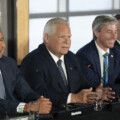Ahh, governing. It’s about responding to the “events” of the day, even if as a prime minister you came to office with a very different set of objectives. The first chapter of this year’s federal budget on housing is a terrific illustration of that.
Over the course of my career, from my time at the Treasury Board Secretariat, the Parliamentary Budget Office, and most recently as the Financial Accountability Officer of Ontario, I have read a lot of federal budgets. But, I don’t remember any budget dealing so extensively with housing. But why now? It was not long ago that Prime Minister Justin Trudeau commented that housing was not a matter of federal jurisdiction.
But, events happen. When U.K Prime Minister Harold Macmillan was asked what was the greatest challenge for a statesman, he replied: “Events, dear boy, events.” A government’s ability to effectively respond to events is what we as electors are counting on when we elect one.

The housing affordability crisis that we now face has been roughly 20 years in the making. It was about then that housing supply started to lag housing demand, and the gap has been rising steadily ever since. The gap has largely been attributed to the lag in supply. Others have written extensively on how that’s been allowed to happen, including a 2022 report by the Province of Ontario’s Housing Affordability Task Force and the Smart Prosperity Institute. The report outlined 55 recommendations to increase the attainability of homes for rent and sale across the province.
Our ability to “fix” the housing crisis is not a newfound thing. All levels of government have had the tools to do so. But “events” got in the way.
A timeline of major “events”
In the early 1990s, governments were running very large deficits, to the point that those deficits became unaffordable. The “event” of the day was to get those deficits under control. As a consequence, the federal government stopped funding social housing in 1993. Provincial governments started to download social services to the municipalities, which included affordable housing. So housing supply at the lower-cost end of the market started to dwindle.
Fast-forward to this current Liberal government’s term of office. When the Trudeau government swept into power in 2015, among its (many) priorities, renegotiating NAFTA was not in their election platform. But with the election of Donald Trump as U.S. president, the government faced a critical test. The most important relationship for our economic growth and well-being was threatened. The renegotiation of NAFTA was a huge effort. I knew people intimately involved. It was a full-court press from all levels of government and from all parties. There wasn’t much disagreement on its importance, and behind the scenes anyway, it was almost a nonpartisan issue.
When building their next platform for the 2019 election, the government could have never predicted the “event” that was the COVID-19 pandemic. Much has been said about COVID-19, but the aftereffects were also unplanned. Because governments around the world shut down their economies, supply chains got backed up, so economies suffered from lack of many things, from toilet paper to airline travel. Because most people were still earning an income, or being supported by a government program, there was still a reasonable level of spending in the economy.
The resulting increase in the inflation rate was something we hadn’t seen for almost 40 years—yet another “event.” To tame inflation, the Bank of Canada raised interest rates to their highest level in about 30 years. All of this happened just between 2020 and 2024. Oh yes—Russia also invaded Ukraine. This was the first time a European country invaded another in many decades.
The other “event” has been a very significant increase in the rate of immigration. We live in a country whose fertility rate is lower than the replacement rate. We depend on immigration to support economic growth, which in turn helps governments pay for things like education and health care. However, unprecedented levels of immigration have also put a lot of strain on all government services and housing infrastructure. These services have not kept pace with the level of demand for many years.

Hoping for housing
My assessment comes down to economic incentives. Those who currently own a home and benefit most from the rapid appreciation in housing prices are by coincidence the same people who have a significant degree of control over how much and what type of housing gets built. Compounded by a rapid increase in Canadian immigration is the significant population migration to large urban centres over the past quarter century, adding pressure to urban planning.
In Canada, and especially in Ontario, land use planning—the function of allocating land for housing and employment—is notionally under provincial jurisdiction. However, the nuts and bolts of building permits are actually handled at the municipal level. I have been fortunate, in my role as a member of the Peel Transition Board, to learn a lot about these nuts and bolts. And what I found most acutely is that, up until 20 years ago, planning departments actually had a culture of enabling housing. But that culture has changed to one that now inhibits housing growth.
Given that municipal governments are highly responsive to their local constituents, why would this be? Political science teaches us that it is easier for constituents, be they individual cities or larger entities, to influence their political decision-makers in a smaller jurisdiction than a larger one. As a result, city councilors are very attentive to the needs of their constituents. This is a good thing in a democracy, but when it comes to housing it has resulted in not being able to “see the forest for the trees.”
When it comes to housing, the result I’ve witnessed is an undue focus on protecting the “character” of a neighbourhood. This has meant protecting the value of the existing housing stock at the expense of making more housing stock available, at a more affordable price, to accommodate and encourage population growth. When we price people out of the housing market, they will eventually find somewhere else to move. When we live in a country whose population is aging. This puts added pressure on government-provided services such as health care and pensions.
When we live in a country where the natural rate of population growth is below the replacement rate, we rely on immigration to ensure population growth, economic growth, and an increase in our standard of living. We, who have benefitted from the rapid appreciation of the value of our homes, are dependent on the next generation to provide for us, as our productive capacity starts to decline along with our health. This is the “forest.” Our home prices are the “trees.”
Events…The federal government is trying to address this latest ”event” in its budget. From a government whose prime minister at one point did not consider housing to fall within his jurisdiction, to now that same prime minister who has put forward a wide-ranging set of policies designed to increase housing supply and to try to make housing more affordable for future generations. Let’s see if it works.
Recommended for You

The Week in Polling: Kinew is Canada’s most popular premier, low optimism for urban home ownership, dead heat in swing states ahead of U.S. presidential election

The Weekly Wrap: The real reason Poilievre should be upset with CTV

Donald Wright: When it comes to where people want to live, Canada is a very small country

Stephen Staley: Bring on the carbon tax election











